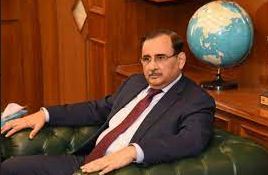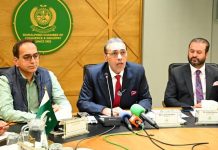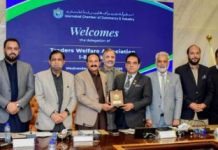ISLAMABAD, JUN 9 /DNA/ – The Businessmen Panel (BMP) of the Federation of Pakistan Chambers of Commerce and Industry (FPCCI) has announced to endorse the Pak-China consensus on up-gradation of the China-Pakistan Economic Corridor (CPEC) and advancing the high-quality development to the second phase, especially the shifting of the Chinese manufacturing units to Pakistan, demanding the government for equal opportunities to Pakistanis in CPEC projects.
The FPCCI former president and BMP Chairman Mian Anjum Nisar said the government needs to provide equal facilities to the local business community, as are given to the Chinese investors, endorsing the PM Shehbaz Sharif and Chinese President Xi Jinping resolve to further deepen cooperation across diverse fields ranging from political and security to economic, trade, and people-to-people exchanges.
The Businessmen Panel chief declared to endorse the Pak-China agreement to set a new direction of the China-Pakistan Economic Corridor for future cooperation in high economic impact areas, especially the shifting of the Chinese manufacturing units to Pakistan.
Mian Anjum Nisar said that the relocation of Chinese industry to Pakistan and providing Chinese financing facilities for future projects are the welcome steps and if we could put all energies and provide enabling environment, the newly-agreed framework has the potential to transform the country from low-income to a middle-income country in the next few years. He asked the government to focus only on those projects that had a high impact on Pakistan’s economy.
According to reports, the decisions to expand the CPEC scope were taken during PM Shehbaz meeting with Chinese representatives. He said the meeting was fruitful and the agreed framework was promising, as it had set a new direction for the CPEC and hoped that the second phase of CPEC would yield tangible progress towards a shared goal of making this project a resounding success.
He said that high consideration should be given to socio-economic and industrial cooperation in the second phase of CPEC. He underscored that bilateral economic cooperation should proceed as planned for the mutual benefit of both the brotherly countries. It was decided to expand the CPEC to copper, gold, oil, gas and affordable housing sectors, as the copper and mineral development would benefit both the countries since China remained one of the largest copper importers.
Mian Nisar said that only the oil and gas sectors have the potential to attract up to $10 billion Chinese investment. He maintained that the revival of Pakistan Steel Mills with the help of China could also reduce the import bill by $4 billion.
He said that Pakistan’s security challenges had roots in its neighborhood and to meet the challenges, there was a need to completely fence the country’s borders with Afghanistan and Iran.
He said that the CPEC will be a gateway of progress and prosperity for a bright future. He added that next year would prove to be a significant year for China-Pakistan Economic Corridor, as several significant milestones will be achieved by the end of the year.
It is to be noted that the top leaders of the friendly countries also reaffirmed the time-honored ‘All-Weather Strategic Cooperative Partnership. PM Shehbaz held a long and in-depth discussion in meeting with President Xi. Chief of the Army Staff General Asim Munir was also present in the meeting. The two leaders were accompanied by the federal ministers and senior officials. This was the premier’s first meeting with the president of China since assuming office in 2024.
The meeting was marked by traditional warmth reflective of the ironclad friendship and close strategic ties between the two countries. PM Shehbaz thanked President Xi for the warm and gracious welcome accorded to him and his delegation in China.
Commending President Xi’s visionary Belt and Road Initiative (BRI) and Global Development Initiative (GDI), the prime minister underscored that as the flagship project of BRI, CPEC had significantly contributed to Pakistan’s socioeconomic development. The two leaders reaffirmed the consensus for high-quality development of CPEC and timely completion of major ongoing projects.
PM Shehbaz reaffirmed Pakistan’s commitment to the high-quality development of CPEC and to foster synergy between the development strategies of the two countries through close coordination. He underlined Pakistan’s commitment and full support for the safety and security of Chinese nationals, projects and institutions in Pakistan.
Shehbaz briefed Xi on Pakistan’s policies for economic reform and sustained growth, industrial development, agricultural modernization and regional connectivity and the critical role played by CPEC in the country’s development. He underlined that the Pakistani government’s agenda for people-centric, socio-economic development resonates with the concept of ‘shared prosperity’ embraced by China.
The Chinese president also hosted a banquet in honour of PM Shehbaz, where another round of discussion on different matters of mutual interests was held.
Pakistan and China will also continue to consult closely on issues of regional and global significance and multilateral fora, especially during the two-year tenure of Pakistan as a non-permanent member of the UN Security Council.
The delegation-level talks were followed by an MoU signing ceremony, witnessed by PM Shehbaz Sharif and Premier Li Qiang, where both signed 23 MoUs and agreements deepening cooperation in transport infrastructure, industry, energy, agriculture, media, health, water, socio-economic development and others of mutual interest.












